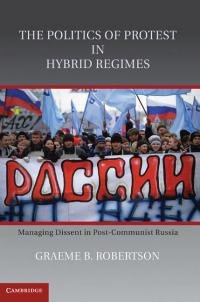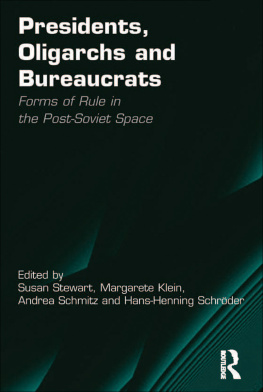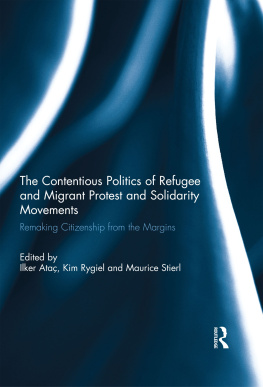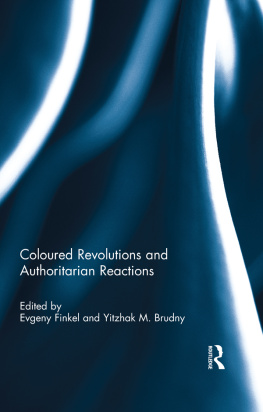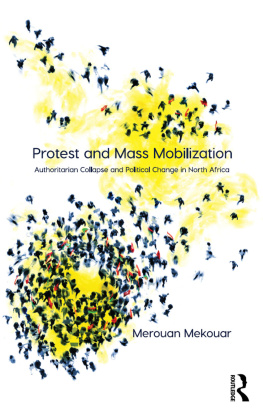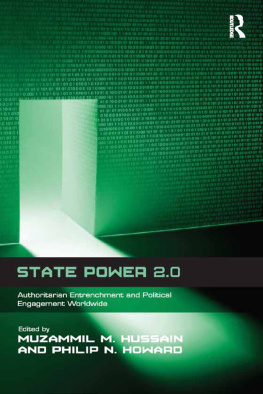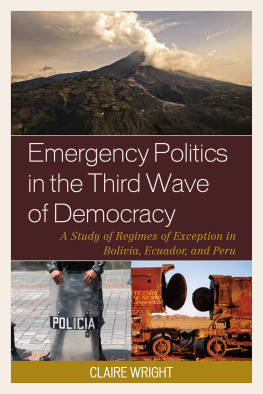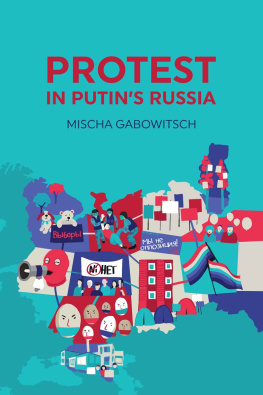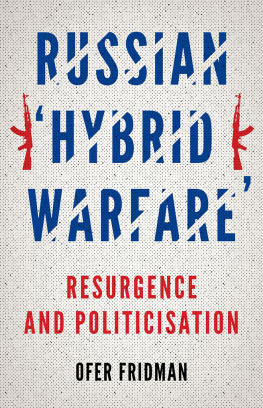The Politics of Protest in Hybrid Regimes Since the end of the Cold War, more and more countries feature political regimes that are neither liberal democracies nor closed authoritarian systems. Most research on these hybrid regimes focuses on how elites manipulate elections to stay in offi ce, but in places as diverse as Bolivia, Georgia, Kyrgyzstan, Serbia, Thailand, Ukraine, and Venezuela, protest in the streets has been at least as important as elections in determining the fate of governments. The Politics of Protest in Hybrid Regimes builds on previously unpublished data and extensive fi eldwork in Russia to show how one high-profi le hybrid regime manages political competition in the workplace and in the streets. More generally, the book develops a theory of how the nature of organizations in society, state strategies for mobilizing supporters, and elite competition shape political protest in hybrid regimes.
Graeme B. Robertson is Assistant Professor of Political Science at the University of North Carolina at Chapel Hill. His research focuses on labor, social movements, political protest, and the problems of governance in authoritarian regimes. He has published articles in the American Political Science Review ,
Comparative Politics , the
Slavic
Review , Communist and Post-Communist Studies , Pro et Contra , and the Journal of Democracy .
The Politics of Protest in Hybrid Regimes
Managing Dissent in Post-Communist Russia
GRAEME B. ROBERTSON
University of North Carolina at Chapel Hill
cambridge university press
Cambridge, New York, Melbourne, Madrid, Cape Town, Singapore, So Paulo, Delhi, Dubai, Tokyo, Mexico City
Cambridge University Press
32 Avenue of the Americas, New York, ny 10013-2473, usa www.cambridge.org
Information on this title: www.cambridge.org/9780521118750
Graeme B. Robertson 2011
This publication is in copyright. Subject to statutory exception and to the provisions of relevant collective licensing agreements, no reproduction of any part may take place without the written permission of Cambridge University Press.
First published 2011
Printed in the United States of America
A catalog record for this publication is available from the British Library.
Library of Congress Cataloging in Publication data Robertson, Graeme B., 1969
The politics of protest in hybrid regimes : managing dissent in post-communist Russia / Graeme B. Robertson.
p. cm.
isbn 978-0-521-11875-0 (hardback)
1. Dissenters Russia (Federation) 2. Protest movements Russia (Federation) 3. Russia (Federation) Politics and government 1991 I. Title.
dk510.763.r63 2010
322.40947dc22 2010031357
isbn 978-0-521-11875-0 Hardback
Cambridge University Press has no responsibility for the persistence or accuracy of urls for external or third-party Internet Web sites referred to in this publication and does not guarantee that any content on such Web sites is, or will remain, accurate or appropriate.
To George and Ena Robertson,
for their example, encouragement, and unconditional love.
[a scholar] begins timidly, moderately, he begins by asking a most modest question: is it not from here? Does not a certain country derive its name from that particular place? He immediately quotes such and such ancient writers, and as soon as he detects some kind of a hint, or something that he believes to be a hint, he at once becomes emboldened and self-confi dent, talks to the writers of antiquity like an old friend, puts questions to them and supplies the answers himself, forgetting completely that he has begun with a timid supposition; he already believes that he can see it all, that everything is clear and his argument is concluded with the words: So that is how it was . Then he proclaims it ex cathedra , for all to hear, and the newly discovered truth is sent traveling all over the world, gathering followers and disciples.
Nikolai Gogol, Dead Souls
Contents
List of Tables
page xi
List of Figures
xiii
Acknowledgments
xv
Introduction
1
Hybrid Regimes
4
Russian Lessons and a Theory of Protest in Hybrids
6
Theoretical Implications
8
Literature on Contentious Politics and SocialMovements
8
Industrial Confl ict
11
Hybrid Regimes and Repression
11
Politics in Russia through the Lens of Protest
13
Structure of the Book
16
1
Protest and Regimes: Organizational Ecology, Mobilization Strategies, and Elite Competition
18
How Regimes Affect Contention
19
Protest in Democracies
19
Protest in Closed Autocracies
20
Protest in Hybrid Regimes
22
Organizational Ecology
24
State Mobilizing Strategies
30
Elite Competition
34
Summary of Regime Effects on Contention
35
How Contention Affects Regimes
38
2
Protest and Regime in Russia
40
Post-Communism and Protest
42
Data on Protest
44
What, Who, and Why
49
Protest Repertoires
51
vii
viii
Contents
Protest Participants
55
Nature of the Demands Made
59
Conclusion: Protests without Movements
62
3
The Geography of Strikes
67
Strike Patterns
69
The Ecology of Organizations and Protest
72
Labor: Trading Cooperation for Survival
73
Social Partnership at the Regional Level
75
Mobilization Strategies, Elite Competition,
and
Strike
Patterns
79
Hypotheses and Measures
81
Political Power
81
Other Resources
82
Capacity
83
Alternative Explanations: Business Cycles, Information,and
Hardship
84
Strike Data
87
Models and Results
88
Other Forms of Protest
94
Organizational Realities and Hybrid Regimes
97
4
A Time for Trouble
100
Protest and Time
101
Demonetization, Wage Arrears, and Protest
105
Center-Periphery Confl ict Over Rules and Resources
109
Primakovs Appointment and Protest Dynamics
112
Conclusion
123
5
Elections and the Decline of Protest
124
Political Protest and the Paradox of the 1999 Elections
126
Theories of Protest Decline
130
Putins Political Strategy and Protest Decline
132
Parallel Elections and the Separation of the Nationaland
the
Local
137
Denationalizing Protest
141
Conclusion: Bandwagons, Protest, and Regime
145
6
Vladimir Putin and Defeat-Proofi ng the System
147
Incorporating Labor into the Vertical
149
Enlisting the Regional Political Machines
151
Defeat-Proofi ng the Electoral System
155
A New Electoral Party of Power
156
Political Product Differentiation: Sponsored Parties
Next page
